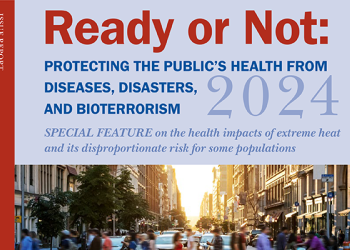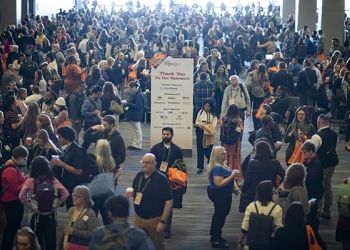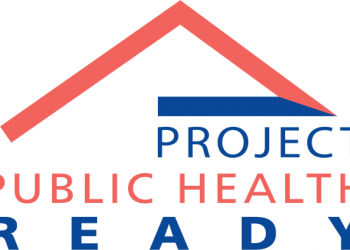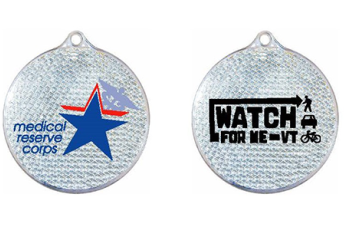This month two Medical Reserve Corps (MRC) units share the strategies they are implementing to increase their unit’s capacity to better serve their communities.
Summit County Health Department MRC (UT)
When Summit County Health Department MRC (SCHD) received a $25,000 in RISE Award in 2021, the unit leader’s goal was to build the capacity of trained and ready volunteers to respond to the COVID-19 pandemic. Christopher Crowley, SCHD MRC unit leader, planned to achieve the goal by increasing the number of MRC volunteers in their unit, having a part-time position dedicated to the MRC program, and developing all necessary MRC training materials for the volunteers.
SCHD MRC grew their volunteer base from 30 to nearly 500 during the COVID-19 mass vaccination effort. However, Crowley points out that they “were not prepared for that exponential increase” as the MRC operations were handled by a third-party organization. Due to this, the MRC “lacked structure, direction, as well as a full understanding of the scope of response during large scale emergencies.” However, he said COVID-19 proved as a wake-up call for this unit in understanding “how large and complex MRC deployments can be and how quickly resources (workforce) are consumed”.
Summit County Health Department reclaimed the leadership of the MRC unit as the first step to effectively deploy its 500 volunteers. Secondly, it incorporated: just-in-time recruiting, training, and management allowing them to build the infrastructure and operational capabilities required to meet mission requirements. Lastly, the health department adapted the city’s Readiness Initiative plans to COVID-19 response and capitalized on the experience of the former staff from the “2002 Olympic Games” to “execute a highly successful mass vaccination response.” Feedback received in a post-deployment survey from volunteers suggested that the unit had “exceptional management, organization, and safety at the mass vaccinations sites”. The SCHD MRC unit has not only increased in the number of volunteers but also increased their capacity by providing necessary training, organization, and management during their COVID-19 response. Crowley concluded that their strategy was effective and it is their intent to “duplicate that success” in their future MRC planning.
“Post COVID-19, the Summit County Health Department has retained oversite of the unit, hired an MRC Coordinator to focus on operations, and is currently developing a robust MRC program featuring professional management, documented and tested plans, contiguous contact, training, and interaction with volunteers. Summit County Health Department has formally launched our new Medical Reserve Corps program featuring extended training opportunities covering a wide range of emergency response and community support skills and certifications. In addition, the SCHD MRC is working directly with our community partners to help train, support, and integrate our collective resources,” said Crowley.
Bollinger County MRC (MO)
Bollinger is a rural county in Missouri with a population of 10,556, no hospitals, two small medical clinics, and one county health department. This proved to be a challenge for Bollinger Country MRC during COVID-19 as they had limited resources, no in-patient medical facilities, and geographical separation from medical care. However, Kevin Cooper, the MRC coordinator says that the MRC members “were extremely helpful in providing services during COVID-19.”
Bollinger County received a $75,000 RISE Award with a goal to Respond, Innovate, Equip, and Sustain. Kevin Cooper, serves as the Bollinger County MRC coordinator and had an extensive plan to significantly increase unit membership, training opportunities, and certified deployable unit members. Along with improving volunteer tracking systems, equipping his unit with technology, and developing training curriculum/ database. Increasing capacity to respond during COVID-19 meant that this MRC unit needed to increase the number of deployable MRC members and successfully support mass vaccination efforts. Cooper and other members of the unit collaborated with community partners such as the County Fire districts, faith-based organizations, and other community organizations to recruit members/volunteers.
Collaborating with established community organizations was crucial for this unit as Cooper mentions that the “population served can be somewhat distrustful of ‘Government Activities.’ Since the MRC Unit members were working side-by-side with our state partners, an increased level of trust was provided.”
This proved to be incredibly effective as the unit saw a 26% increase in the number of volunteers and increased trust from the residents. Cooper notes that “local stakeholders visibility added credibility and reached a portion of our citizens that may not have taken advantage of our programs otherwise!” With increased volunteers, established trust, and local stakeholders, their mass vaccination efforts went from being two volunteers in a tent to 5-6 nurses/healthcare workers in a trailer that was used as a “mobile clinic.” In the initial stages of COVID-19 pandemic, Bollinger County MRC was able to vaccinate 225 to 260 residents per day with their limited resources. As the pandemic progressed, Bollinger County MRC helped support two additional mass vaccination clinics by “assisting in the organization, staffing, and operation” vaccinating over 2,100 individuals in each of the two events.









